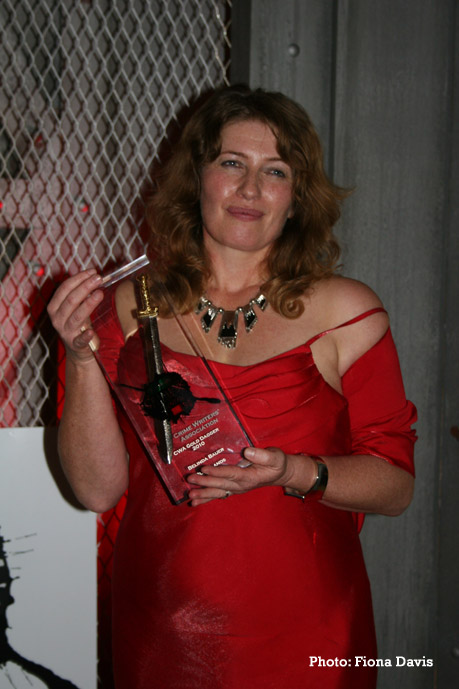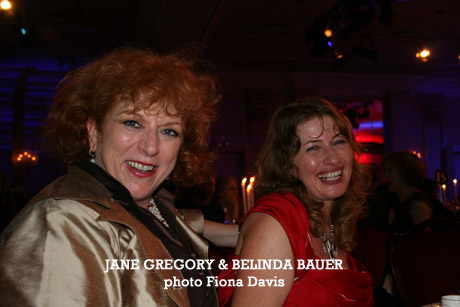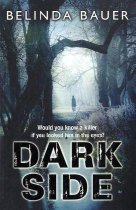Belinda Bauer is surely this year’s greatest inspiration
for unpublished crime novelists. In a mere two years, Blacklands has gone from being an unpublished manuscript that was
‘highly commended’ at the 2008 CWA Debut Dagger competition, to winning this
year’s top crime-fiction prize, the CWA Gold Dagger.

The novel’s premise is fascinating and unique: a boy
called Steven Lamb wants to mend his family, which was torn apart when his
Uncle Billy was murdered by the serial killer Arnold Avery. So he writes to
Avery in prison, asking him where on Exmoor his uncle’s body is buried. So
begins a game of cat and mouse between a boy who wants the truth, and a killer
who wants to play.
When I congratulate Belinda on her Gold Dagger win, she
says, ‘I’m absolutely thrilled. My agent was quite alarmed when I was
shortlisted because I was a debutante. But because I’m so new to this game, I
was more sanguine about it. I was so lucky. It’s nice to repay someone’s faith
in you.’
Belinda’s agent is Jane Gregory, whose agency represents
some of the cream of British crime fiction, including Val McDermid, Minette
Walters and Mo Hayder. Jane’s faith in Belinda began with the Debut Dagger
nomination. ‘Jane contacted me before the awards and I met her in London. I
wasn’t keen to commit to an agent. I said, “I’ll come to meet you but not
sign.” She got ratty with me on the phone. Good, I thought; she’ll be able to
shout at people for me! I did keep my options open, though.’
It was only after Belinda had googled Jane’s name that she
realised what a great agent she’d landed. ‘When we met we got on really well. I
signed with Jane on the Monday and the book sold to Transworld by Friday. I got
an enormous number of offers. Jane’s very proactive. I’m a real blob; the
thought that Jane’s out there hustling for me is fantastic.’
It’s not surprising the novel attracted so much attention.
Not only is it beautifully written, it also has that compelling premise. ‘I
think I was really lucky to stumble on this premise for my first book. It was
such a strong premise it was like the engine of a train. Everything in the book
was almost inevitable.
‘As I say in the notes, the idea was sparked by seeing
Winnie Johnson [mother of Keith Bennett, the only Moors murderers’ victim whose
body was never found] on television. Every so often they still interview her on
Saddleworth Moor. Everyone knows her but this time it broke my heart. It must
be really hard for the rest of the family too and I started to think along
those lines, how a crime can reverberate through the generations. As soon as
I’d come up with that character, the book wrote itself.’
In fact, Blacklands
is as much a family drama as it is a crime novel. Steven, traipsing over the
damp foggy moors with a shovel slung over his shoulder – prepared to spend
hours, weeks, months digging for his uncle – is a
moving and endearing mixture of innocence and determination. I say to Belinda
that he reminded me a little of a non-Asperger’s version of Christopher in Mark
Haddon’s The Curious Incident of the Dog
in the Night-Time.
‘I didn’t intend or think that this was a crime novel,’
Belinda confirms. ‘My motivation was to study the relationship between Steven
and his grandmother.’
Indeed, what makes Steven so real, so human, is that he
isn’t some sort of saint or hero but a normal boy with complex emotional needs.
‘He has selfish motives. He’s a boy who feels that he’s not getting what he
needs from his family. I always described it as a coming-of-age novel with a
twist. For me, the only thing that makes a book worthwhile is the human
reactions. Blacklands is a really
good demonstration of that, because despite the fact that people recognise that
the story has a high concept, they love Steven’s character. I think every
character I create has an element of myself in him, but Steven in particular
came out of my own experience. I was quite a solitary child, even though I have
sisters and quite a big family.’
On the subject of the characters, I say to Belinda that
the settings – the fictional Devonian town of Shipcott and the dreamlike fogs
that wrap themselves around the moor – are almost characters in their own
right. Did she have any real town in mind?
‘Shipcott’s kind of a pastiche of two towns, Landkey and
Swinbridge. Although they aren’t even on Exmoor they kept on popping into my
mind: a village on a slightly curving road, everything crowded onto the road,
with doorsteps opening right onto the pavement.’
And yet Belinda lives in Wales. ‘I’m not a native of
Exmoor, but my uncle used to run a pub on the edge of Exmoor. It’s so small and
pretty – it’s a chocolate box moor. I really liked that juxtaposition between
that and the horror of what lies beneath. You can’t think of Saddleworth Moor
without thinking of the Moors murderers, but I think they’re naturally bleaker
and more frightening. But I’ve been on Exmoor in the mist and it’s quite
impenetrable. It really made an impression on me, so I went back there to get
things right. But it had made such an impression on me that there was almost
nothing to change.’
An ingenious prison escape, when Avery builds benches in
the prison workshop and uses them to vault over the prison wall, could stretch
credibility. Ironically, it is the one part of the story that is based on fact.
‘The last escape from Dartmoor was in exactly that manner,’ Belinda explains, ‘on
benches made in the workshop. The walls were only twelve feet tall and the
benches were six feet long. As soon as I’d found that out I had to use it. It
was a lucky accident.’
Such lucky accidents, Belinda explains, come from paying
attention to details. ‘Especially towards the end, I’ll suddenly realise that
something I said on page 14 just for a bit of colour is really useful. You
create your own luck by being conscientious.’
Belinda has previously worked as a scriptwriter and
journalist. Her script entitled The
Locker Room won her the Carl Foreman/Bafta Award for Young British
Screenwriters, which was presented to her by Sidney Poitier. I ask her
whether her attention to detail stems partly from these disciplines, and what
sort of influence they’ve had on her novel-writing.
‘I think both scriptwriting and journalism were a huge
influence – just incredibly useful because you have to write to length and be
very succinct. And with scriptwriting you have the added pleasure of getting
people’s voices in your head properly. I took an acting class one time, and I
realised very, very quickly that saying words that have been badly written is a
humiliating experience. And when you’re asked to deliver lines that are well
written, you seem like a real actress. I really hate clunky dialogue. The
downside of being so succinct was that it meant that when I started to write Blacklands, a whole chapter fitted onto
a page! It took me a few days to enjoy the creativity of writing prose.
‘Several people have said, “What are your influences?” The
more I think about the question, I think that my influences are song lyrics.
I’m such an admirer of bands like The Boomtown Rats or Pulp – they can say so
much in a couple of lines. That is genius! And being able to set it to music
and cram it into three minutes. When I write I sometimes feels it’s a piece of
music. I get really defensive of pop music – it’s an art form that combines so
many skills.’
Including razor-sharp humour. Belinda bursts out laughing
down the phone as she tells me her two favourite Country & Western song
titles: ‘It’s your fault our kids are ugly’, and ‘I shaved my legs for this?!’
A lot of that sharp humour finds its way into Belinda’s
second novel, which will be published in January. In Darkside, the most vulnerable residents of Shipcott are being
murdered. The village bobby Jonas is out of his depth, so the Taunton police
force barges in and starts running the case. Cue plenty of conflict between a
local policeman who understands the community and outsiders who treat him like
a yokel.
Like Blacklands,
Darkside is built on a brilliant and
ingenious premise – but one that can’t be explained without revealing the
killer’s identity. I tell Belinda that I was kicking myself afterwards because
all the clues are there, right from the start.
‘When we were editing Darkside,
my editor kept on asking, “Do you think we’re giving away too much?” You do
worry about it, and it’s hard to be objective because you can’t unread the end
of it. The idea originally seemed like a gift. I literally sold it to
Transworld on one line. And then I realised it was actually incredibly
difficult and I was scared that it was impossible to do. It was a struggle.’

I say to Belinda that, as a reader, I want the writer to
keep me in the dark until the end – but I have to feel that I can trust the
writer to lead me from confusion to a satisfying conclusion. Belinda agrees. ‘Trust
is the most valuable thing that any artist can do. On the X Factor, the singers that you enjoy most are the ones that you know
are never going to miss a note. They do the right thing at the right time.’
Like a singer under pressure from a live audience, worried
about hitting all the right notes, Belinda had a form of stage fright with Darkside. ‘I had a horrible experience
writing Darkside after Blacklands, because you don’t want to
let people down. There were weeks towards the end when I had to take my
computer on holiday with me. I was panic-stricken that it was terrible and I
knew everyone would hate it. My agency’s in-house editor, Stephanie, looks at
books before they go to the publisher. When I didn’t hear from her, I was thinking
they were trying to wriggle out of the contract. I finally phoned Jane and she
said, “Oh, it’s already gone to Transworld. Brilliant!”
‘You get so close to the work. You’re living with it every
day for six to seven months and eventually you lose objectivity. I always read
it afterwards, and every time you read it you see millions of mistakes. You
know you could improve it for another year.’
I mention to Belinda that I was intrigued to read an
earlier interview where she said she was working on her second novel, but it
was called Tipping Point. Why the
name change?
‘It was Tipping
Point all the way through and the marketing people didn’t like the title. I
think it was a better title but I can understand that Darkside is snappier and I chose it myself. With Blacklands they tried to get me to
change the title to Writing to the Devil
but I really stuck to my guns – I felt that if they were going to market it as
a crime novel I wanted to maintain the integrity of the title even if I
couldn’t necessarily maintain the strict
integrity of the genre. I didn’t want to mislead people who wanted to buy it as
a conventional crime novel. The title is everything – even when scriptwriting
I’d get very defensive about the title.’
The titles Blacklands
and Darkside do, of course, sound
similar – and there are shared features in both novels. They are both set in
the fictional town of Shipcott, and Steven – older and more wary after his
traumatic experiences in Blacklands –
has a few cameo appearances in Darkside.
And yet the plots are radically different – the atmosphere too, with Darkside having a tragi-comic quality at
times. The dark humour is particularly noticeable in the bickering and
sarcastic putdowns between old-school copper Marvel, the university-educated
sergeant Reynolds, and Jonas.
‘Again, like the dialogue thing, I think that life is so
funny. Even in the middle of tragedy and horror, people say inappropriate
things that are funny. Blacklands is
a really funny book in places and the relationship between Steven and Lewis
[Steven’s best friend] is uplifting. I felt it was such an optimistic book.
‘In the midst of life we’re in death. Nobody is
permanently miserable, nobody is constantly funny. I just think that’s the way
humans are – if you have characters who are always heroic or silly, it doesn’t
ring true. And I really enjoyed writing Marvel, and the interplay with
Reynolds. The scenes between him and Lucy [Jonas’s invalided wife] were
possibly the best part of the book for me. He’s been a shit all his life and
then he has an epiphany. And then he’s an ultra shit – he gets even worse!’
Darkside also
has a lot of dramatic irony, especially with the huge twist at the end. ‘I
really loved the end. Everything in novels often works out so pat, but life is full
of contradictions and loose ends. You just bumble through it.’
Belinda, judging by her great novels, is bumbling through
just fine.

DARKSIDE
Released 6th January 2011
Bantam £11.99 pbk
BUY IT
medical abortion pill online
click here cytotec abortion pill buy online
my girl friend cheated on me
link online
cheat on husband
online married men who cheat
why husbands cheat
read I cheated on my girlfriend
i cheated on my husband with his best friend
blog.e-lecta.com is it my fault my husband cheated
my wife cheated on me now what do i do
link your wife cheated on you
wife adult stories
open adult stories choose your own adventure
walgreens pharmacy coupons new prescription
maray.nl coupon pharmacy
cheat
read infidelity signs
free printable viagra coupons
allied.edu free discount prescription card
cialis.com coupon
is-aber.net free discount prescription card